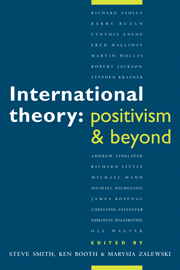Book contents
- Frontmatter
- Contents
- List of contributors
- Preface and acknowledgements
- Introduction
- I Debates
- II Legacies
- 2 The timeless wisdom of realism?
- 3 The growing relevance of pluralism?
- 4 The inter-state structure of the modern world-system
- 5 The accomplishments of international political economy
- 6 The continued significance of positivism?
- III Silences
- IV Openings
- V Directions
- Index
5 - The accomplishments of international political economy
Published online by Cambridge University Press: 09 March 2010
- Frontmatter
- Contents
- List of contributors
- Preface and acknowledgements
- Introduction
- I Debates
- II Legacies
- 2 The timeless wisdom of realism?
- 3 The growing relevance of pluralism?
- 4 The inter-state structure of the modern world-system
- 5 The accomplishments of international political economy
- 6 The continued significance of positivism?
- III Silences
- IV Openings
- V Directions
- Index
Summary
Introduction
International political economy (IPE) is concerned with the political determinants of international economic relations. It tries to answer questions such as: How have changes in the international distribution of power among states affected the degree of openness in the international trading system? Do the domestic political structures and values of some states allow them to compete more effectively? Is the relative poverty of the Third World better explained by indigenous politics and economic conditions in individual countries or by the workings of the international political economy? When can international economic ties among states be used for political leverage?
International political economy can be contrasted with conventional economics and with security studies. Conventional economists ask many of the same questions as do students of IPE but their answers are related to economic factors such as savings rates, labour markets, or technical knowledge rather than political factors like the international distribution of power or the relationship between the state and the private sector. Students of international security ask different questions like: what are the causes of war? or when are alliances likely to be stable? but offer explanations that are similar to those deployed by scholars who work on international political economy.
The study of international political economy has been guided almost exclusively by the canons of what John Searle has labelled the Western Rationalistic Tradition which is characterised by the assumption that reality exists independently of the way in which it is represented by humans and that the truth of a statement depends on how well it conforms with this independent reality (Searle, 1993, p. 57).
- Type
- Chapter
- Information
- International TheoryPositivism and Beyond, pp. 108 - 127Publisher: Cambridge University PressPrint publication year: 1996
- 35
- Cited by

